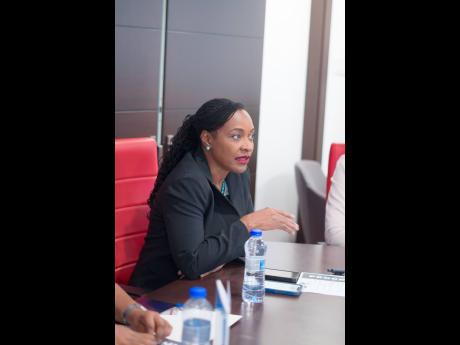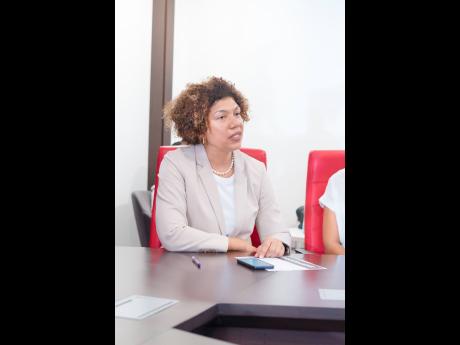Firm on funding
Smith declares early childhood needs won’t be sacrificed to address tertiary deficiencies through National Budget
With the tabling of the 2024-2025 National Budget coming up this week, and repeated calls being made to increase funding for the tertiary sector, Marsha Smith, state minister in the Ministry of Education and Youth, is insisting that the Government is not open to pulling more from the early childhood sector to do so.
For years, the education sector has received the majority of funding from the Budget, with, for example, the then Ministry of Education, Youth and Information receiving the largest share of the Government’s $853.5-billion Budget for 2020-2021, totalling some $117 billion.
Smith said resourcing of early childhood institutions has been an ongoing challenge since as far back as when she was part of that cohort, and educators from the early childhood sector would be furious if some of their proposed funding were to be reduced to help build the tertiary level.
“One of the important things of the TREND, which is Transforming Education for National Development, is the focus on the pillar related to early childhood education. Somebody spoke to me recently about, ‘Oh, we need to spend more money for tertiary education’, so I said to the person, ‘Let me tell you something. Uou’re going to have a pushback from early childhood [educators]’,” Smith said while delivering her address as guest speaker during the launch of a GoFundMe page for the One Tab In Schools Initiative last week, which was held at the offices of Barita Foundation in New Kingston.
“Early childhood is going to tell you that if you do not lay the foundations, there will be nobody to go to your tertiary institutions, so when we come together like this in public-private partnership to fill the deficiencies that exist in the sector, I am always very pleased,” she said.
Smith noted that the early childhood sector faces issues with financing because it goes beyond the payment of just the teachers to provision of implements needed to build the brain and to allow for fertile ground to be created.
The One Tab In Schools Initiative is geared at getting persons across the world to donate funds for the purchase of at least 1,000 solar-powered tablets for needy children in Jamaica.
The initiative is powered by Barita Foundation, Project for the Advancement of Childhood Education (PACE) Canada, the National Education Trust (NET), and other partners.
Each tablet issued under the One Tab In Schools Initiative consists of reading material titled Suzy, the Curious Snail Explores the Garden, which is authored by Marjorie Straw, International Women’s Forum (IWF) Global Leaders Fellow 2023 and early childhood advocate.
NEED TO GET SERIOUS
Prior to Smith’s address, Straw argued that Jamaica needs to get more serious about early childhood education.
“Let’s just get serious about this, shall we? Let’s do more for early childhood education so that although it is an overused term, that pipeline is strengthened right throughout our education system. As early an age as a child can read or have access to the tools that he or she will need to read and write, to have an appreciation for numeracy, not to shy away or be nervous about math, is a very important step for the future of Jamaica because we must change the statistics. We must change the number of students who, when they get to the first grade, we must change that number to increase the number of persons who enter those grades reading, writing, and doing math comfortably,” Straw said.
“This is so important because I have seen it first-hand where persons are leaving our school systems, who are leaving much older, who are still grappling with these areas. And if we’re serious about growth in Jamaica, we cannot ignore the human capital side of that equation. Human capital starts at that age. Not at 18 [years] or 16 or at that stage. It must be a deliberate effort from as early as two or three years old, and it must continue in a very deliberate manner throughout the years so that our students; our children, can actually feel comfortable, not daunted, not frightened about not being able to read or write,” she said.
Hitting back, Michelle Campbell, director of Cross-Sectorial, Early Childhood Commission (ECC), who was also in the room, stated that the pipeline Straw was speaking of had already been established.
“Through the Ministry of Education [and Youth], our partners, that pipeline has been established, but it’s really to improve that pipeline. That pipeline begins with the child development health passport,” Campbell said.
“At the early childhood level, we have developed what we call our Jamaica School Readiness Assessment. In term three of every year, we assess approximately 28,000 children with their teachers with numeracy, literacy, behaviour, and health. And from there, from that assessment, we can then determine if they need additional assessment, meaning our secondary assessment, which is the Ages and Questionnaire Jamaica that was specifically designed by the University of Oregon and the University of the West Indies for our children,” she said.
AN OBVIOUS GAP
From that tool, she said, parents and assessors go into the schools and develop their Individual Support Learning Plan to support students who need it.
“So there is a process in place, but again, we need to improve upon that and put more funding towards it,” she said.
“What we are finding is that right now, we have a gap. We need more speech therapists. We need more child psychologists. We need more child development therapists for our children at no cost,” Campbell said.
Marlene Thompson, an early childhood educator from the Union Gardens Infant School, added her voice to the conversation by boosting Campbell’s position.
“You say inclusion, but ... the children with special needs ... we the teachers who are not specially trained to manage them, it is a task. It is a task to get them from where they are to where we want them to be. It is a task,” Thompson said.
“It’s very tiring sometimes, but we have to do it. Right now, my eyes are shutting, but it is for a good cause. We really need the specialists. We do, and that’s my take,” she said.
Campbell said that more than 130 brain builder centres have been developed islandwide since they were launched in 2018, focusing on the development of two-year-olds with exposure to early stimulation, nutrition, and social protection.


